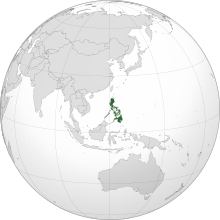 | |
| Status | Legal |
| Military | Gays, lesbians and bisexuals allowed to serve openly since 2009 |
| Discrimination protections | None at the national level but many anti-discrimination ordinances exist at the local government level. |
| Family rights | |
| Recognition of relationships | None |
| Restrictions | The Family Code of the Philippines defines marriage as "a special contract of permanent union between a man and a woman". The Constitution of the Philippines does not prohibit same-sex marriage.[1] |
| Adoption | Allowed for individuals but not allowed for same-sex couples. |
The lesbian, gay, bisexual, transgender and queer (LGBTQ) people in the Philippines are generally accepted in Filipino society, and it has been ranked among the most gay-friendly countries in Asia.[2] It has the second highest social acceptance rate in the Asia-Pacific next to Australia, according to a Pew Research Center survey in 2013.[2][3] Despite this, some discrimination still persist and LGBT people have limited LGBT-specific rights, leading some activists to characterize LGBT culture in the Philippines as "tolerated, but not accepted."[2][4] Homosexuals in the Philippines are known as "bakla", though there are other terms to describe them.[5] According to the 2002 Young Adult Fertility and Sexuality Survey, 11 percent of sexually active Filipinos between the ages of 15 and 24 have had sex with someone of the same sex.[6] According to Filipino poet and critic Lilia Quindoza Santiago, Filipino culture may have a more flexible concept of gender. Kasarian (Tagalog for "gender") is defined in less binary terms than the English word;[7] kasarian means "kind, species, or genus".[8]
- ^ "CBCP exec: US should respect PHL law regarding same-sex marriage | Pinoy Abroad | GMA News Online". gmanetwork.com. Retrieved 6 April 2014.
- ^ a b c Cite error: The named reference
inquirerwas invoked but never defined (see the help page). - ^ "The Global Divide on Homosexuality". Pew Research Center. Retrieved 14 June 2024.
- ^ Gutierrez, Natashya (17 May 2017). "LGBTQ activists: We are tolerated but not accepted in the Philippines". Rappler. Retrieved 14 June 2024.
- ^ Gonzalo, Ally (2 October 2019). "'There's No Shame in Being Who You Are': Photographer Explores Filipino 'bakla' Culture". CBC. Retrieved 9 May 2021.
- ^ "Survey shows young Filipinos are opening up homosexual activities" (PDF). 23 July 2003. Archived from the original (PDF) on 1 April 2005. Retrieved 5 December 2009.
- ^ Garcia, J. Nelia C. (2000). "Performativity, the bakla and the orienting gaze". Inter-Asia Cultural Studies. 1 (2): 265–281. doi:10.1080/14649370050141140. S2CID 145490503.
- ^ "Kasarian". Tagalog-English Dictionary. Retrieved 9 May 2021.